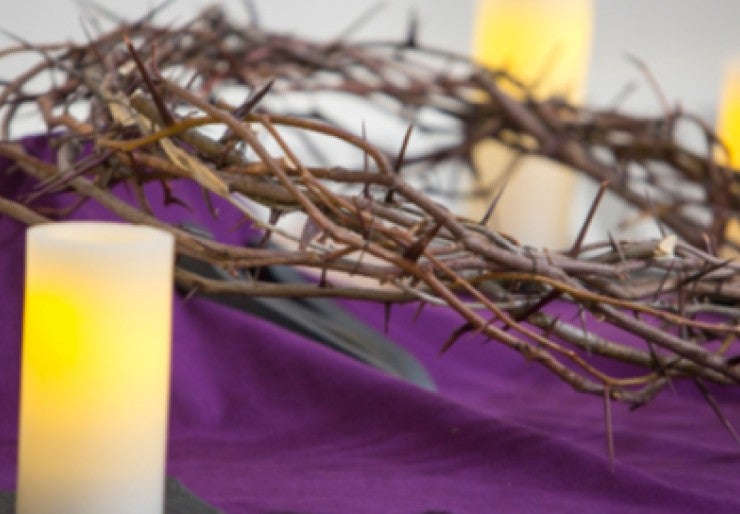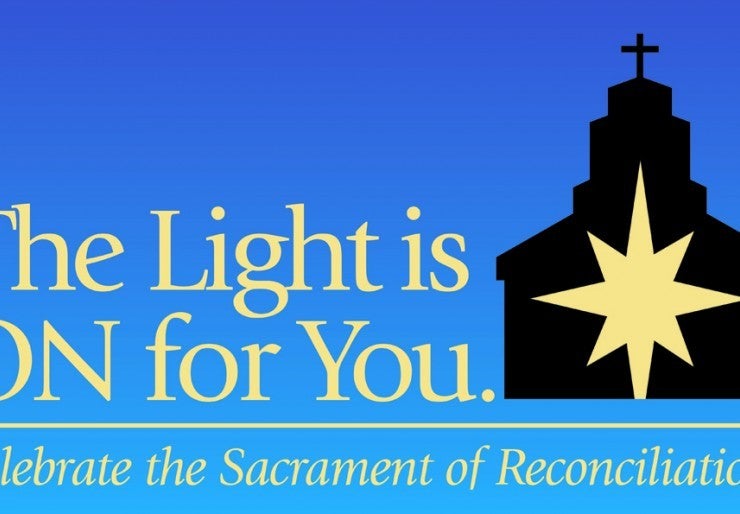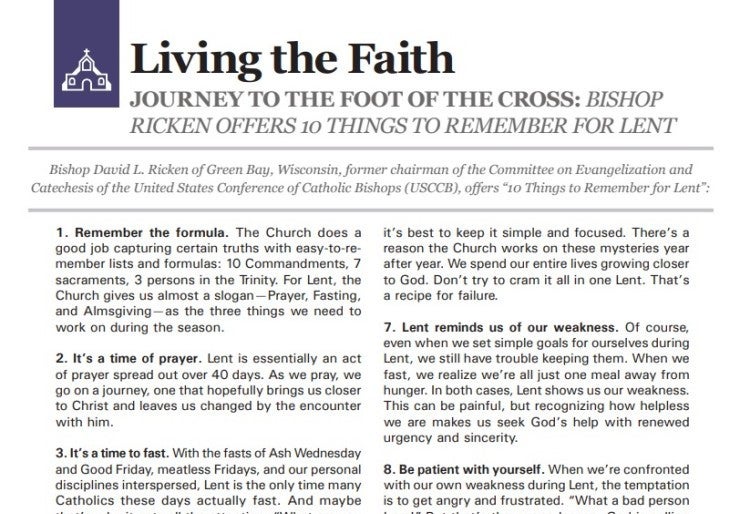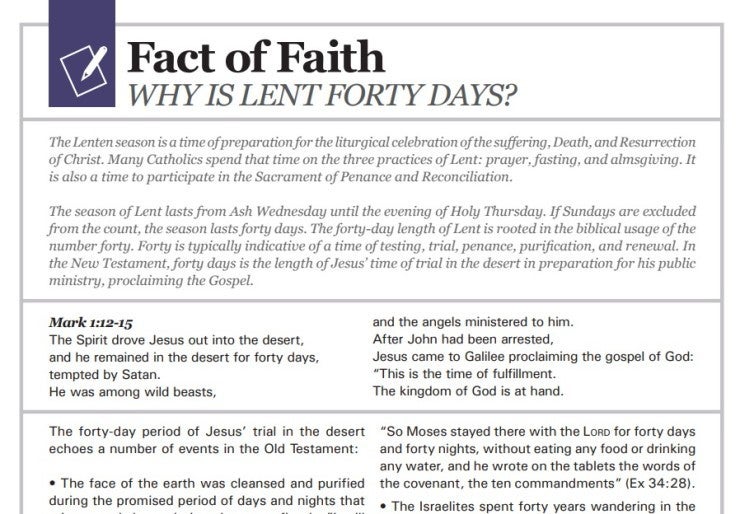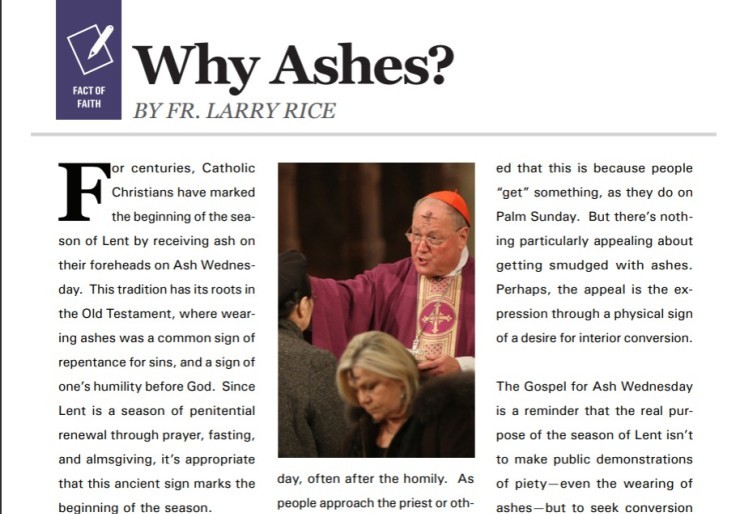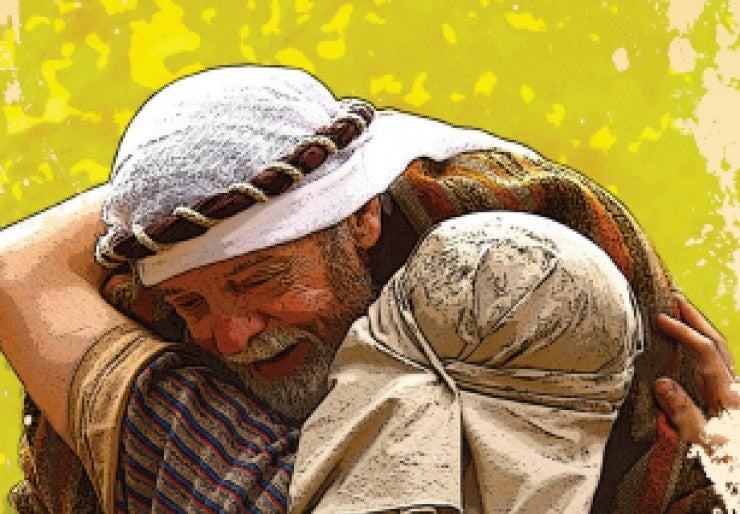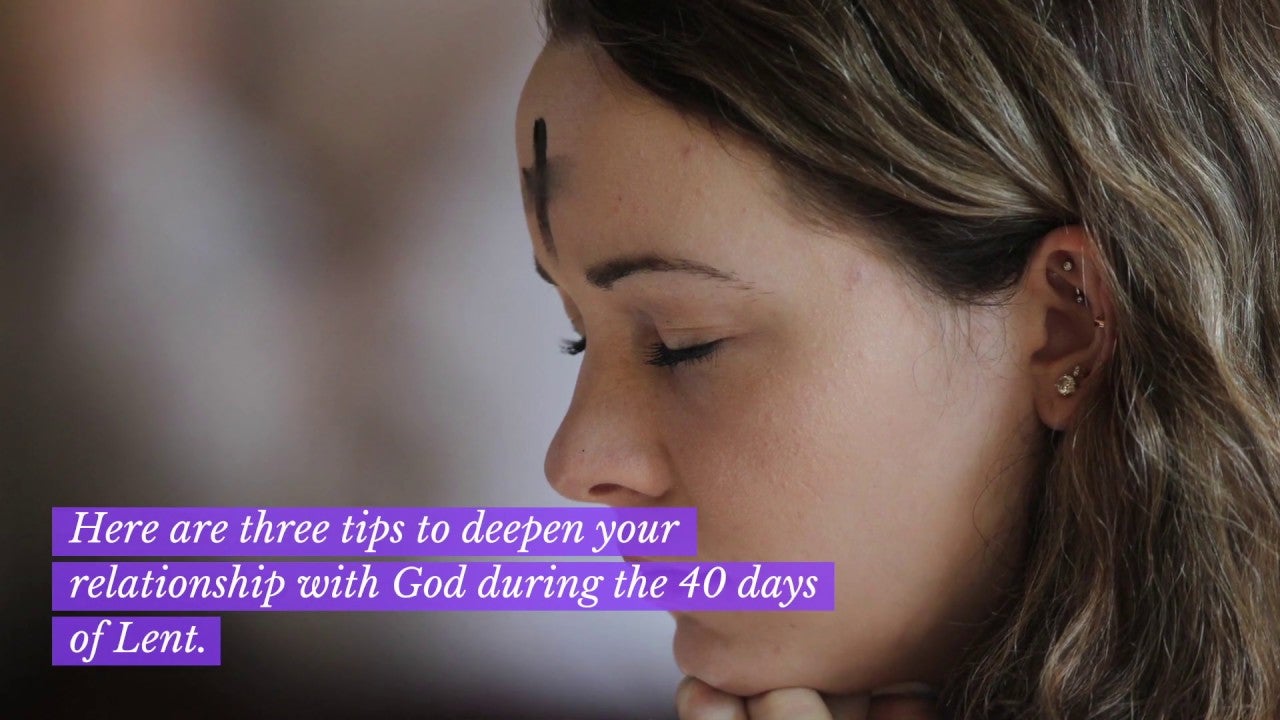What is Lent?
Wednesday, February 18, 2026 - Thursday, April 2, 2026
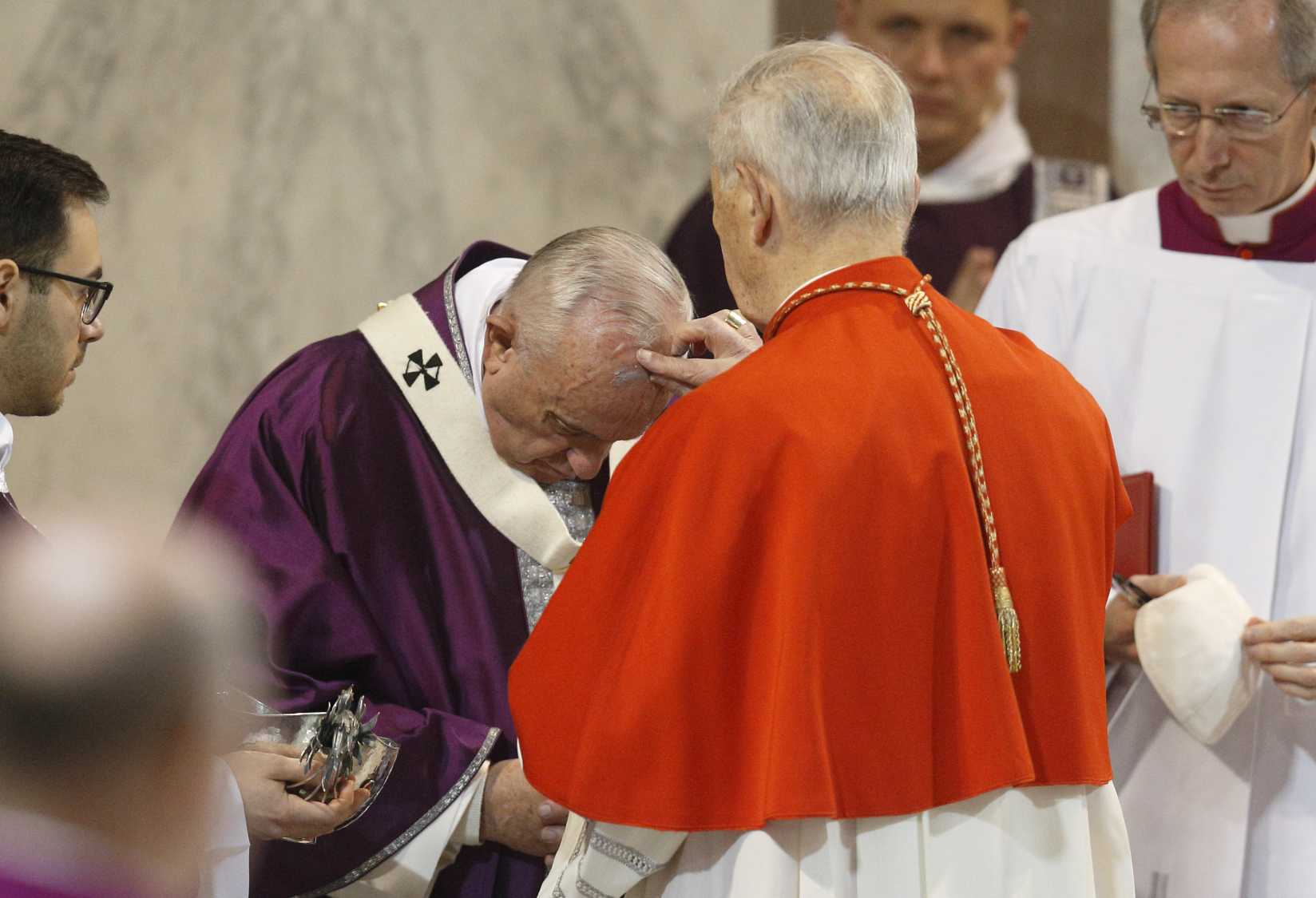
Lent is a 40 day season of prayer, fasting, and almsgiving that begins on Ash Wednesday and ends at sundown on Holy Thursday. It's a period of preparation to celebrate the Lord's Resurrection at Easter. During Lent, we seek the Lord in prayer by reading Sacred Scripture; we serve by giving alms; and we practice self-control through fasting. We are called not only to abstain from luxuries during Lent, but to a true inner conversion of heart as we seek to follow Christ's will more faithfully. We recall the waters of baptism in which we were also baptized into Christ's death, died to sin and evil, and began new life in Christ.
Many know of the tradition of abstaining from meat on Fridays during Lent, but we are also called to practice self-discipline and fast in other ways throughout the season. Contemplate the meaning and origins of the Lenten fasting tradition in this reflection. In addition, the giving of alms is one way to share God's gifts—not only through the distribution of money, but through the sharing of our time and talents. As St. John Chrysostom reminds us: "Not to enable the poor to share in our goods is to steal from them and deprive them of life. The goods we possess are not ours, but theirs." (Catechism of the Catholic Church, no. 2446).
In Lent, the baptized are called to renew their baptismal commitment as others prepare to be baptized through the Order of Christian Initiation of Adults, a period of learning and discernment for individuals who have declared their desire to become Catholics.
Lenten Resources
Daily Reading
Take a Moment to Pray
with Today's Readings
Prayer, Fasting, & Almsgiving
Prayer
"For me, prayer is a surge of the heart; it is a simple look turned toward heaven, it is a cry of recognition and of love, embracing both trial and joy." -St. Therese of Lisieux (CCC 2558)
During Lent, we are asked to devote ourselves to seeking the Lord in prayer and reading Scripture, to service by giving alms, and to practice self-control through fasting. Dive into God's word in Scripture this Lent or pray the rosary with your family.
Fasting
Ash Wednesday and Good Friday are obligatory days of fasting and abstinence for Catholics. In addition, Fridays during Lent are obligatory days of abstinence.
For members of the Latin Catholic Church, the norms on fasting are obligatory from age 18 until age 59. When fasting, a person is permitted to eat one full meal, as well as two smaller meals that together are not equal to a full meal. The norms concerning abstinence from meat are binding upon members of the Latin Catholic Church from age 14 onwards.
Members of the Eastern Catholic Churches are to observe the particular law of their own sui iuris Church.
If possible, the fast on Good Friday is continued until the Easter Vigil (on Holy Saturday night) as the "paschal fast" to honor the suffering and death of the Lord Jesus and to prepare ourselves to share more fully and to celebrate more readily his Resurrection.
Resources on Fasting
For members of the Latin Catholic Church within the United States, please see the USCCB's Pastoral Statement on Penance and Abstinence and the complementary norm to canon 1253 and the Code of Canon Law (cc. 1249-1253)
CRS Rice Bowl is also one way Catholics can enhance their Lenten fasting practice by giving up meals and donating the cost of those meals to Catholic Relief Services in order to help those who do not have enough to eat.
Almsgiving
The foundational call of Christians to charity is a frequent theme of the Gospels. During Lent, we are asked to focus more intently on "almsgiving," which means donating money or goods to the poor and performing other acts of charity. As one of the three pillars of Lenten practice, almsgiving is "a witness to fraternal charity" and "a work of justice pleasing to God." (Catechism of the Catholic Church, no. 2462).
Opportunities for Almsgiving during Lent
There are several special opportunities for almsgiving through donations to Church ministries for which collections are conducted during the Lenten season including:
- Collection for the Church in Central and Eastern Europe
- National Black and Indian Mission Collection
- Catholic Relief Services Collection
- Pontifical Good Friday Collection - Providing Care to Christians in the Holy Land
- CRS Rice Bowl
Many dioceses hold special appeals for local needs during Lent and there are countless other ways to offer your time, talent and treasure to needy individuals and organizations during Lent and throughout the year. For ideas, contact your diocesan Social Concerns office or your local Catholic Charities affiliate.
The USCCB Department of Justice, Peace and Human Development has a variety of Resources and Tools on the Church's social mission and the option for the poor, including an updated Poverty Tour.
Lent FAQs
What are the upcoming dates for Lent?
2024: Wednesday, February 14 - Thursday, March 28
2025: Wednesday, March 5 - Thursday, April 17
2026: Wednesday, February 18 - Thursday, April 2
Why do we say that there are forty days of Lent? When you count all the days from Ash Wednesday through Holy Saturday, there are 46.
It might be more accurate to say that there is the "forty day fast within Lent." Historically, Lent has varied from a week to three weeks to the present configuration of 46 days. The forty day fast, however, has been more stable. The Sundays of Lent are certainly part of the Time of Lent, but they are not prescribed days of fast and abstinence.
So does that mean that when we give something up for Lent, such as candy, we can have it on Sundays?
Apart from the prescribed days of fast and abstinence on Ash Wednesday and Good Friday, and the days of abstinence every Friday of Lent, Catholics have traditionally chosen additional penitential practices for the whole Time of Lent. These practices are disciplinary in nature and often more effective if they are continuous, i.e., kept on Sundays as well. That being said, such practices are not regulated by the Church, but by individual conscience.
I understand that all the Fridays of Lent are days of abstinence from meat, but I'm not sure what is classified as meat. Does meat include chicken and dairy products?
Abstinence laws consider that meat comes only from animals such as chickens, cows, sheep or pigs --- all of which live on land. Birds are also considered meat. Abstinence does not include meat juices and liquid foods made from meat. Thus, such foods as chicken broth, consomme, soups cooked or flavored with meat, meat gravies or sauces, as well as seasonings or condiments made from animal fat are technically not forbidden. However, moral theologians have traditionally taught that we should abstain from all animal-derived products (except foods such as gelatin, butter, cheese and eggs, which do not have any meat taste). Fish are a different category of animal. Salt and freshwater species of fish, amphibians, reptiles, (cold-blooded animals) and shellfish are permitted.
I've noticed that restaurants and grocery stores advertise specials on expensive types of fish and seafood on Fridays during Lent. Some of my Catholic friends take advantage of these deals, but somehow I don't feel right treating myself to this
While fish, lobster, and other shellfish are not considered meat and can be consumed on days of abstinence, indulging in the lavish buffet at your favorite seafood place sort of misses the point. Abstaining from meat and other indulgences during Lent is a penitential practice. On the Fridays of Lent, we remember the sacrifice of Christ on Good Friday and unite ourselves with that sacrifice through abstinence and prayer.
I understand that Catholics ages 18 to 59 should fast on Ash Wednesday and on Good Friday, but what exactly are the rules for these fasts?
Fasting on these days means we can have only one full, meatless meal. Some food can be taken at the other regular meal times if necessary but combined they should be less than a full meal. Liquids are allowed at any time, but no solid food should be consumed between meals.
Are there exemptions other than for age from the requirement to fast on Ash Wednesday and Good Friday?
Those that are excused from fast and abstinence outside the age limits include the physically or mentally ill including individuals suffering from chronic illnesses such as diabetes. Also excluded are pregnant or nursing women. In all cases, common sense should prevail, and ill persons should not further jeopardize their health by fasting.

